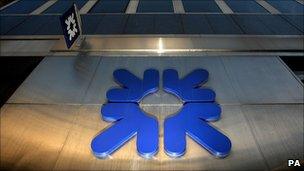Eurozone subsidy for UK in Greek bailout
- Published
- comments

RBS was bailed out by the UK government in 2008
George Osborne has pledged that UK taxpayers won't participate directly in the new bailout of Greece (though there will be an indirect exposure via any new contribution by the International Monetary Fund).
What he might have whispered is that - in fact - the UK has found itself in the fortunate reverse position: in effect the British taxpayer is receiving a subsidy of several hundred million euros from Germany, France and other eurozone members.
This is how that subsidy is paid.
Royal Bank of Scotland, which is 83% owned by taxpayers, holds a fraction over 1bn euros of Greek sovereign debt in its available-for-sale banking book (these are Greek government bonds initially purchased by RBS as part of its management of liquidity).
Now you will be hard pressed to find an analyst or economist who doesn't believe that the true value of this 1bn euros of Greek debt is around 500m euros - because they would argue that on any objective view of what the Greek state can afford to repay over the long term, it needs to write down its 350bn euros of debts by at least 50%.
But under the Greek bailout package announced by eurozone government heads on July 21, creditors are in fact being asked to take a loss of 21%.
The reason the loss can be capped at 21% is because the eurozone is providing 109bn euros of new loans to Greece, the maturity of rescue loans to Greece is being extended to 30 years, and the interest rate on the bailout funds is being slashed to 3.5%.
All of which represents a massive transfer from eurozone taxpayers to eurozone banks and other commercial creditors of Greece.
Or to put it another way, if there weren't for a massive subsidy by eurozone taxpayers for Greece, the damage for banks - including Royal Bank of Scotland - would have been considerably greater.
So, as I said, British taxpayers - who own most of RBS - are being subsidised by Germany and France.
PS. I am about to say something which appears to contradict everything I've said above. But it doesn't (honest guv), so bear with me please.
Next week, there is a good chance that RBS will in fact be forced by its auditors to take a 50% or 500m euros hit on its Greek banking book exposure, when it announces its results.
That's because the announcement of the eurozone package in effect represents a Greek default, or so auditors and bankers tell me, so the loan will have to be written down to fair value. And fair value, as I've said above, is widely seen to be half the face value.
But the 50% writedown or loss is likely to persist only for a few weeks.
Here's why.
The eurozone bailout package contains a provision for banks like RBS to swap their existing Greek bonds into new bonds, with a longer maturity and a lower interest rate, underpinned by eurozone taxpayer guarantees.
Now the value of these new bonds is 21% less than the face value of the existing bonds. So the ultimate loss for RBS, as and when it swaps old bonds for new ones, will be 21% of 1bn euros, or around 210m euros - a good deal less than the 500m euros default loss.
So next week RBS is expected to take a 500m euros loss on its Greek exposure, and then - if the bond swap goes through - it is likely to write back 290m euros of this in its full-year results announced early next year.
So, because of what some people would see as the madness of accounting rules, RBS could end up making a 290m euros profit on its Greek exposure in the second half of 2011.
The important point, however, is that at the end of the day, RBS's final loss from its Greek sovereign loans is likely to be 210m euros, and not the 500m euros that would have been the case without the subsidy provided by German, French and other eurozone taxpayers.
That said, and to state the bloomin' obvious, if you take the view that the latest Greek rescue is sticking plaster not cure, RBS's loss could yet escalate.